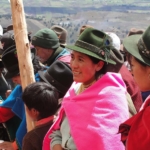


International Centre for Research in Agroforestry
Andes CoP, Centro Bartolomé de Las Casas (CBC), Guaman Poma de Ayala, Consorcio de Organizaciones Privadas de Promoción al Desarrollo de la Micro y Pequeña Empresa COPEME
Peru
8/2014—8/2017
Smallholders in the Andes often receive low prices for crops they sell in the market due to low volume of produce, non-uniform quality, and lack of access to transportation and storage, among other factors. Because they offer smallholders immediate cash, though often at low prices, multiple intermediaries are often involved, even in local market transactions. To access more direct and coordinated markets that can offer higher value, smallholders may benefit from opportunities to strengthen the bonds among themselves and with other actors, such as buyers, support organizations and projects, and political decisionmakers. One model has been niche export markets, but these often require large amounts of one crop of uniform quality. This is unattainable for many smallholders and is not relevant to their diverse farming systems. In this context, there has been a growth in interest in local food networks (LFNs), defined as systems in which food is produced, marketed, and consumed locally. Despite the potential importance of LFNs for rural development in the Andean region and elsewhere, little is known about how to best support the development of LFNs or the impact of LFNs for smallholders and local businesses. The CCRP has supported the creation of one LFN among mid-size cities in Ecuador through the work of the Ekorural project.This project seeks to explore questions and approaches that lead to the building of sustainable LFNs in Cusco, a mid-size city in Peru. Although Cusco has experienced steady economic growth in recent years due to the tourism industry, the small smallholders in the area encounter many of the typical LFNs challenges, including unorganized supply by smallholders and limited access to services for promoting LFNs. During the first twelve months of the proposed project, the team will assess the business, regulatory, and institutional environment (including the provision of services) for the development of sustainable LFNs in Cusco. The project team will also characterize existing LFNs in Cusco, including key actors, inputs and outcomes achieved, and existing strategies. During the next 24-months, the project will work directly with existing networks in the Cusco area and with actors looking to establish a network. The project will help define and implement network development strategies; provide technical backstopping, monitoring, and mediation where needed; generate insights into the relevance of LFNs for farming households, with special attention to women and youth; and contribute tools, methods, and lessons for resilient LFN development in the Andes.
The Andes CoP supports projects that allow small smallholders to access produce markets under favorable terms, without sacrificing the health of people or the environment. Markets offer smallholders income generation potential, which can enhance food availability and access, productivity and wellbeing, as well as collective negotiation capacity and full citizenship rights. This project complements the other two market projects in the CoP, namely organic peanut export (Fundación Valles, Bolivia) and solidarity markets (EkoRural, Ecuador). The three market projects, especially when combined with the World Food Program’s school feeding program and the Root Capital quinoa market project, will offer the possibility of better understanding of smallholders’ interactions with diverse markets, and how market options interact with smallholders’ contexts. This project, in combination with the other market projects, will provide knowledge and insights on effective mechanisms, indicators, and assessment methods for building local capacities for the smallholders’ long-term participation in markets, and market-oriented sustainable management of natural resources from an AEI approach.
